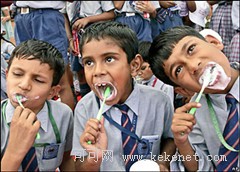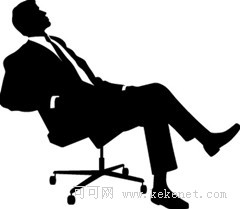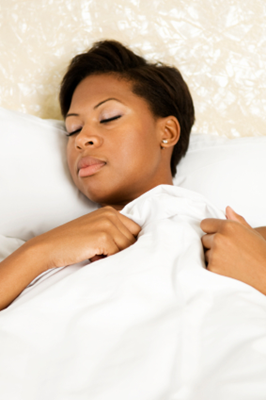Traditional wisdom is that we should brush twice a day, after meals. Well, actually, our obsessive-compulsive tooth-brushing practices lead to deteriorating oral health, including increased numbers of cavities and eventual tooth loss.
每天飯后刷牙?傳統(tǒng)智慧不管用啦。其實(shí)每天的強(qiáng)迫性刷牙會(huì)損害口腔健康,造成蛀牙增多和牙齒脫落。
The reason is that the acidity in food and beverages causes tooth enamel to soften, and brushing right after eating an acidic meal strips enamel from the teeth, leaving them vulnerable to cavities. Leaving a little food behind actually doesn't cause as much damage as your toothbrush does as it scrubs the natural protective layer off the teeth.
食物和飲料中的酸性會(huì)造成牙齒釉質(zhì)軟化,馬上刷牙容易得蛀牙。嘴里留點(diǎn)食物的害處絕對(duì)沒有馬上刷牙大。
So how the hell are we ment to do it?
那我們?cè)撛趺此⒀溃?/FONT>
Studies show that flossing is much more important than brushing. Dental floss actually removes the bacteria that clump together between your teeth, without scrubbing and stripping layers off them.
用牙線清潔牙齒比刷牙要重要得多。牙線可以在不破壞牙齒保護(hù)層的情況下清理牙齒間堆積的細(xì)菌。
Long periods of sitting increase your risk of diabetes, heart disease and even cancer, no matter how much you work out when you're not sitting. Sitting down for long periods of time means that you'll probably die earlier. This is all because of the invention of chairs.
長(zhǎng)期保持坐姿會(huì)增加得糖尿病、心臟病和癌癥的風(fēng)險(xiǎn),甚至可能意味著早死。罪魁禍?zhǔn)资且巫拥陌l(fā)明。
When you're sitting on a chair, our abdominal muscles relax, and suddenly your spine alone has to take the entire weight of your upper torso. The extra stress puts pressure on your spinal disks and can eventually lead to chronic back pain.
坐在椅子上,我們的腹部肌肉會(huì)放松,整個(gè)上半身的重要只能靠脊椎支撐。脊椎間盤上增加的壓力會(huì)導(dǎo)致慢性背部疼痛。
So how the hell are we meant to do it?
那我們?cè)撛趺醋?/FONT>
Some experts on sitting recommend "active sitting" using an exercise ball, kneeling stool or something else without a high back.
專家建議“積極坐姿”。不管健身球還是凳子,只要沒有高靠背就好。
There's another option : lying back at a 135-degree angle with their feet on the floor. : A study used an MRI showed the least spinal disk movement in this position. So try it at work, and be brave to tell your boss you're avoiding future sick days.
還有另外一個(gè)選擇:腳著地,身體135度仰臥,這樣的姿勢(shì)對(duì)脊椎間盤運(yùn)動(dòng)要求最少。試試這個(gè)姿勢(shì),記得告訴你老板,你是在保證將來的身體健康。




















